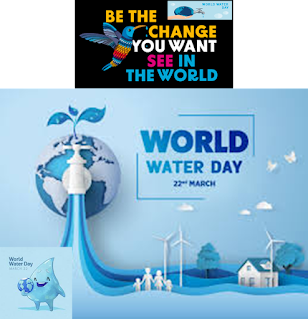22nd March World Water Day
is an annual United Nations observance day held on 22 March that highlights the importance of fresh water.
Every year to spread awareness about the water crisis all over the world
The day is used to advocate for the sustainable management of freshwater resources.
Celebrating World Water Day: The Lifeline for Earth's Existence
Introduction:
Water, the elixir of life, is an irreplaceable resource essential for the sustenance of all living beings on our planet.
Recognizing the significance of water and urging global action to tackle water-related issues, World Water Day is celebrated on March 22nd every year.
In this blog article, we will delve into the purposes of World Water Day and explore the importance of water for every life form on Earth using compelling examples.
1. Ensuring Access to Clean Water:
World Water Day primarily aims to raise awareness about the importance of freshwater and the sustainable management of water resources.
With millions of people worldwide lacking access to clean and safe drinking water, this day serves as a reminder to governments and communities to work towards providing clean water for all.
For instance, in many developing countries, the scarcity of clean water leads to severe health issues and reduces the quality of life. By highlighting such examples, World Water Day underscores the need for collective action and investments to ensure universal access to clean water.
2. Promoting Water Conservation:
Water is a finite resource, and its unsustainable usage has grave consequences for both humans and the environment. The day emphasizes the preservation and protection of water sources through responsible consumption.
For example, excessive irrigation practices in agricultural areas may deplete groundwater resources, causing a decline in the overall water availability.
By promoting efficient water management techniques like drip irrigation and rainwater harvesting, the significance of conserving water is emphasized. This day motivates individuals and industries to adopt sustainable practices that minimize water wastage.
3. Addressing Water Pollution:
The pollution of water bodies poses a significant threat to aquatic ecosystems and human health.
World Water Day serves as a platform to address the issue of water pollution and its detrimental effects.
The example of the Great Pacific Garbage Patch, comprising vast amounts of non-biodegradable waste, showcases the magnitude of the problem.
By raising awareness about this issue, the day encourages individuals and organizations to take action, such as reducing the use of plastic and supporting initiatives that clean and restore polluted water bodies.
4. Climate Change and Water:
Climate change has a profound impact on water sources, including altering precipitation patterns, affecting the availability of drinking water, and causing extreme weather events.
World Water Day highlights the interlinkage between climate change and water and advocates for resilient water resource management practices.
For instance, melting glaciers due to rising temperatures pose a threat to the water supply of millions of people living downstream.
By understanding these connections, policymakers and communities can implement strategies to mitigate the impact of climate change on water resources.
Conclusion:
World Water Day serves as a vital platform to recognize the importance of water for all life forms on Earth.
By emphasizing access to clean water, promoting water conservation, addressing water pollution, and acknowledging the impact of climate change on water, this day seeks to inspire individuals, communities, and governments to take concrete actions.
Let us remember that each drop of water is invaluable and commit to safeguarding this precious resource for both current and future generations

